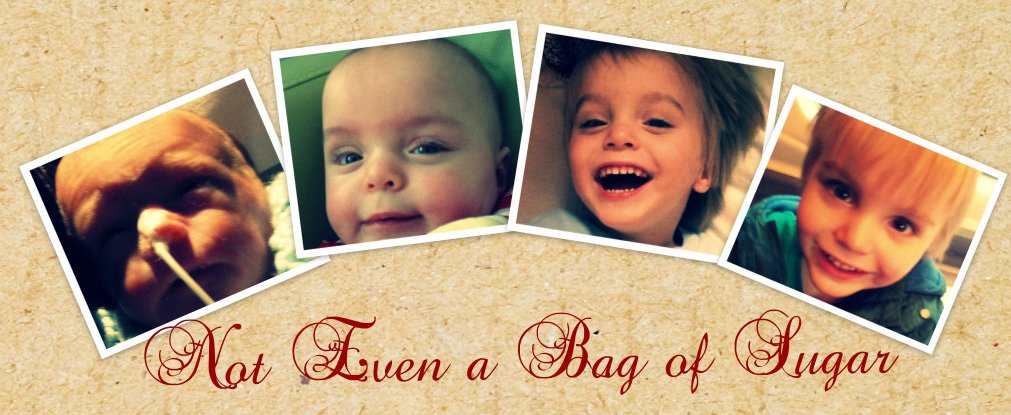I have a few friends at the moment who have babies in special care units in different parts of the UK. It's so heartwarming to see the progress these babies are making, but heart-wrenching too, knowing, that two years ago, that was us. The endless trips to hospital. The soaring highs and crushing lows. Milestones reached, and then setbacks encountered. Frustrating too, dealing with that question "when is your baby coming home?" or glib statements "oh he'll be home soon".
This time last year we had completed over 4 weeks. Joseph had been released from the Intensive Care room, and was in the High Dependency Unit. Although we did not know it at the time, we had 6 and a half weeks to go at this point.
The common misconception is that babies have to be a certain weight for them to come home, and this is not true. I am not sure if it was ever so, maybe it was at one time. Perhaps back thirty or forty years ago there were less indicators that doctors and nurses could use and weight paid more of a part in determining wellness.
The big milestones for a baby to reach appear, to those who have been there, obvious, but for those who haven't had experience of premature babies, its worth going through them.
Breathing - breathing is obviously a biggie. Premature babies have to learn to breathe on the outside, and be able to breathe on their own without assistance. Some premature babies have damaged lungs, chronic lung disease, and for a time will come home on oxygen, sometimes they only need oxygen at night, or when they are poorly, for example, have a cold.
Temperature regulation - in the last trimester, babies lay down fat stores ready for life in the outside world. These fat stores help sustain them particularly in the first few days whilst they sort out this feeding malarky. However, premature babies have not had this opportunity to lay down these reserves, and once on the outside have to burn a lot of calories learning stuff, like breathing. Babies are placed in incubators, and the temperature is slowly, over days and weeks, turned down. Once they are placed in cots, they are usually on a bed warmer (which looks ever so comfy, filled with a fluid pocket, and then covered in a quilt) This too is turned down. Different babies respond in different ways and for some it can take a while to learn to regulate their temperature.
Feeding - this is one of the biggest issues for the premature baby to sort out so that they can go home. In the womb babies learn to swallow, they practice by swallowing amniotic fluid (yuck, doesn't really bear thinking about too much, fluid they have weed and pooed in - no wonder Joseph is quite at home drinking the bath water) but of course, if they are born premature, they have not had much experience doing this. Sucking, swallowing and breathing in the right order is not an easy task, and it can take a long time for the baby to work this out. Added to this, breast feeding can be difficult too, because the mother may not be physically able to spend time on the ward, and many wards do not have the capacity to house mothers wanting to breastfeed, and babies may be offered bottles.
Whilst there isn't a "magic" weight, weight gain is obviously important. More fat stores means better temperature regulation, and it also indicates that feeding is successful. Weight is one of the specific indicators of wellness and that the body is operating well.
In our case, it took a long time for Joseph to feed well. He was very good at temperature regulation, and even now "runs hot" rather than cold. Like me, he would wear a t-shirt 10 months of the year! We were very fortunate with his breathing. Joseph was taken off the ventilator 15 hours after birth and never went back on. However he had CPAP (continuous positive airway pressure) for a long time, and it took him a while to kick the CPAP habit completely, a lot longer than many other 27 weekers I know, but I think that extra time stood him well, as he never needed oxygen once he'd gone off CPAP.
Joseph never managed breastfeeding, his mouth was so tiny and getting sufficient latch, and then Joseph remembering to do all the other things was a huge issue. He managed a lot better with bottles, and once he'd started bottle feeding it took another 3 weeks for him to get home.
I'll never forget the day we were told that discharge planning was in place, and he would be discharged the following Tuesday. I was told on the Monday morning, so we had just over a week. I howled and howled. I had never really let myself think about home, I always just thought to the next step, and never looked at the bigger picture, and it was such a relief to know our journey was coming to an end.

Relief. Yes. I remember it well. Relief and a little bit of terror.
ReplyDeleteGreat article on the criteria for release x